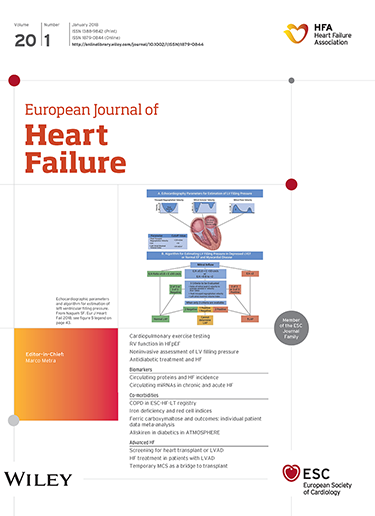Heart failure with preserved ejection fraction in cancer patients and survivors. A scientific statement of the Heart Failure Association of the ESC and the ESC Council of Cardio-Oncology.
IF 10.8
1区 医学
Q1 CARDIAC & CARDIOVASCULAR SYSTEMS
引用次数: 0
Abstract
Heart failure with preserved ejection fraction (HFpEF) is increasingly recognized in cancer patients and survivors, yet it remains underdiagnosed and its epidemiology largely unknown. This statement underscores the imperative need to include HFpEF in the cardiotoxicities identified during or after anticancer treatments. It also highlights the prognostic value of pre-existing HFpEF for periprocedural and cardiotoxicity risk and it discusses the challenges in the diagnosis and treatment of HFpEF in cancer patients. It also explores the aetiologic role of anticancer therapies (chemotherapy, targeted and hormonal therapies and radiotherapy) in the pathogenesis of HFpEF. Special emphasis is given on the importance of considering HFpEF from cancer diagnosis throughout treatment and survivorship and provides useful insights for cardiologists and oncologists in the monitoring and management of these patients. Finally, it highlights the key gaps in current knowledge that require further investigation through well-designed research trials to enhance our understanding and improve clinical outcomes.保留射血分数的心力衰竭癌症患者和幸存者。ESC心力衰竭协会和ESC心脏肿瘤学委员会的科学声明。
保留射血分数的心力衰竭(HFpEF)越来越多地在癌症患者和幸存者中得到认可,但它仍然未得到充分诊断,其流行病学在很大程度上未知。这一声明强调了将HFpEF纳入抗癌治疗期间或之后确定的心脏毒性的迫切需要。它还强调了预先存在的HFpEF对围手术期和心脏毒性风险的预后价值,并讨论了癌症患者HFpEF诊断和治疗中的挑战。它还探讨了抗癌治疗(化疗,靶向和激素治疗以及放疗)在HFpEF发病机制中的病因学作用。特别强调了从癌症诊断到整个治疗和生存期间考虑HFpEF的重要性,并为心脏病学家和肿瘤学家在监测和管理这些患者方面提供了有用的见解。最后,它强调了当前知识中的关键差距,需要通过精心设计的研究试验进行进一步调查,以增强我们的理解并改善临床结果。
本文章由计算机程序翻译,如有差异,请以英文原文为准。
求助全文
约1分钟内获得全文
求助全文
来源期刊

European Journal of Heart Failure
医学-心血管系统
CiteScore
27.30
自引率
11.50%
发文量
365
审稿时长
1 months
期刊介绍:
European Journal of Heart Failure is an international journal dedicated to advancing knowledge in the field of heart failure management. The journal publishes reviews and editorials aimed at improving understanding, prevention, investigation, and treatment of heart failure. It covers various disciplines such as molecular and cellular biology, pathology, physiology, electrophysiology, pharmacology, clinical sciences, social sciences, and population sciences. The journal welcomes submissions of manuscripts on basic, clinical, and population sciences, as well as original contributions on nursing, care of the elderly, primary care, health economics, and other related specialist fields. It is published monthly and has a readership that includes cardiologists, emergency room physicians, intensivists, internists, general physicians, cardiac nurses, diabetologists, epidemiologists, basic scientists focusing on cardiovascular research, and those working in rehabilitation. The journal is abstracted and indexed in various databases such as Academic Search, Embase, MEDLINE/PubMed, and Science Citation Index.
 求助内容:
求助内容: 应助结果提醒方式:
应助结果提醒方式:


